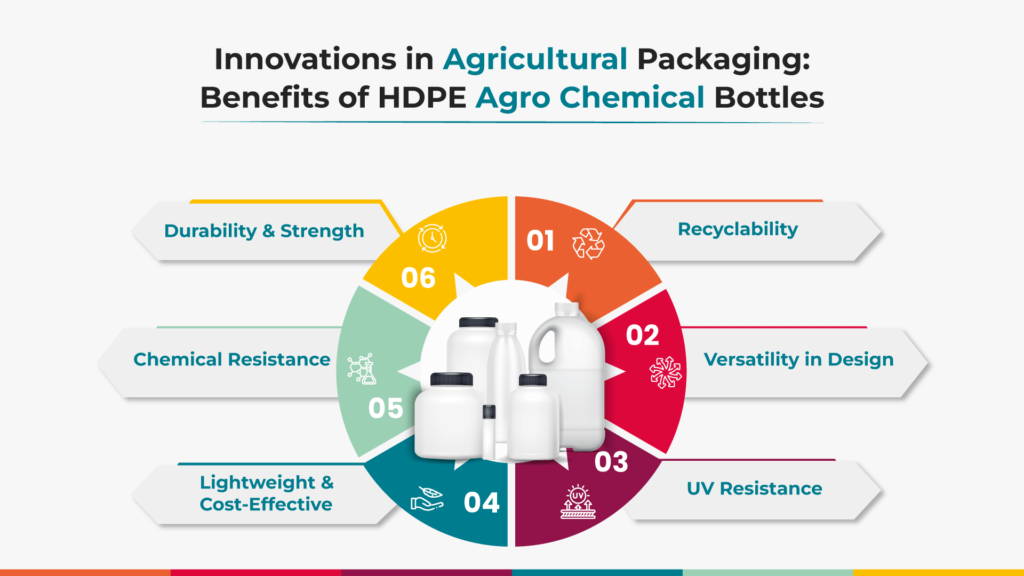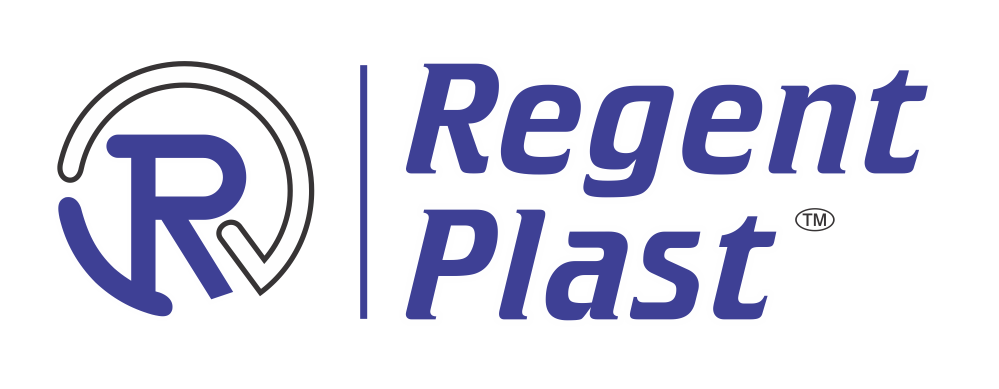Innovations in Agricultural Packaging: Benefits of HDPE Agro Chemical Bottles
Advancements in agriculture field are crucial for sustainable and efficient framing practices. Innovations in packaging play a pivotal role. One such innovation that has significantly contributed to the agricultural sector is the use of High-Density Polyethylene (HDPE) bottles for agrochemicals. These bottles have revolutionized the way pesticides, fertilizers, and other agricultural chemicals are stored and transported. In this blog, we will see the use, need, and benefits of HDPE agrochemical bottles, exploring how they have positively impacted agriculture over the years.

The Need for Innovative Agricultural Packaging?
Agricultural chemicals are highly potent substances that require careful handling and secure containment to prevent environmental contamination and ensure the safety of farmers and consumers. Traditional packaging materials, such as glass and metal, have limitations in terms of weight, durability, and cost-effectiveness. This is where the need for innovative agricultural packaging arises.
HDPE bottles address these challenges effectively. Their lightweight nature reduces transportation costs, making them a cost-efficient option. Additionally, HDPE’s durability ensures that the chemicals are well-protected during storage and transportation, minimizing the risk of leaks or spillage. The inert nature of HDPE also makes it resistant to chemical reactions, preserving the integrity of the agrochemicals inside.
The Use of HDPE Agrochemical Bottles:
HDPE, a thermoplastic polymer known for its high strength-to-density ratio, has become the material of choice for agrochemical packaging. The versatile nature of HDPE makes it suitable for a wide range of agricultural products, including pesticides, herbicides, fungicides, and fertilizers. HDPE agrochemical bottles are designed to withstand the harsh conditions often associated with agricultural storage and transportation, providing a reliable and durable solution for packaging.
What are the Benefits of HDPE Agrochemical Bottles?
1. Durability and Strength:
HDPE agrochemical bottles are renowned for their durability and strength. They can withstand rough handling, impacts, and environmental stressors, ensuring that the chemicals inside remain secure. This durability contributes to the reduction of product wastage and enhances the overall efficiency of the agricultural supply chain.
2. Chemical Resistance:
Agricultural chemicals often have corrosive properties that can compromise traditional packaging materials. HDPE, however, boasts excellent chemical resistance, providing an effective barrier against the potential reactivity of agrochemicals. This resistance ensures that the chemical composition of the product remains unchanged, maintaining its efficacy and safety.
3. Lightweight and Cost-Effective:
The lightweight nature of HDPE bottles offers a practical advantage in terms of transportation costs. As compared to heavier alternatives like glass, HDPE reduces shipping expenses and makes the supply chain more cost-effective. This weight advantage also facilitates ease of handling for farmers and other end-users.
4. Recyclability:
Sustainability is a growing concern in agriculture, and HDPE addresses this by being a highly recyclable material. The ability to recycle HDPE agrochemical bottles reduces environmental impact, promotes a circular economy, and aligns with the broader goals of sustainable agriculture.
5. Versatility in Design:
HDPE allows for versatile bottle design, catering to various sizes and shapes based on the specific requirements of different agrochemicals. This flexibility in design ensures that packaging is tailored to the characteristics of the product, enhancing both functionality and user convenience.
6. UV Resistance:
Exposure to sunlight can degrade the quality of agrochemicals over time. HDPE bottles often come with UV-resistant properties, protecting the contents from the harmful effects of sunlight and maintaining the efficacy of the chemicals for an extended period.
How HDPE Bottles Have Helped Agriculture Over the Years?
The adoption of HDPE agrochemical bottles has had a transformative impact on agriculture, contributing to increased efficiency, safety, and sustainability. Here are some key ways in which HDPE bottles have positively influenced the agricultural sector:
1. Improved Product Safety:
The robustness and chemical resistance of HDPE bottles provide a secure environment for agrochemicals. This ensures that farmers and other users can handle and apply these products without the risk of exposure to harmful substances, enhancing overall safety in agricultural practices.
2. Enhanced Supply Chain Efficiency:
The lightweight nature of HDPE bottles reduces transportation costs, making the supply chain more efficient. This is particularly beneficial for farmers in remote areas who may face logistical challenges. The durability of HDPE also contributes to a reduction in product losses during transit.
3. Extended Shelf Life of Agrochemicals:
The chemical resistance and UV protection offered by HDPE bottles contribute to the extended shelf life of agrochemicals. This is crucial for farmers who may need to store these products for an extended period before use, ensuring that the chemicals retain their effectiveness over time.
4. Environmental Sustainability:
The recyclability of HDPE aligns with the growing emphasis on environmental sustainability in agriculture. By choosing recyclable materials, the industry can reduce its carbon footprint and promote responsible waste management practices.
5. Adaptability to Varied Climates:
Agriculture is practiced in diverse climates, and HDPE’s resistance to environmental stressors makes it suitable for use in various conditions. Whether in hot and humid climates or cold and dry regions, HDPE agrochemical bottles maintain their structural integrity and protect the contents effectively.
Why HDPE Bottles Are Effective for Agriculture?
1. Material Properties:
The inherent properties of HDPE, including its durability, chemical resistance, and UV protection, make it an ideal material for packaging agrochemicals. These properties ensure that the bottles can withstand the challenges associated with the agricultural environment.
2. Customization and Design:
HDPE allows for the customization of bottle design to suit the specific needs of different agrochemicals. This adaptability ensures that packaging is tailored to the characteristics of the product, optimizing functionality and user convenience.
3. Lifecycle Considerations:
The recyclability of HDPE aligns with the growing emphasis on the entire lifecycle of products. HDPE bottles can be recycled and repurposed, contributing to a circular economy and minimizing the environmental impact of agricultural packaging.
4. Regulatory Compliance:
HDPE is a material that complies with regulatory standards for packaging in the agricultural sector. Meeting these standards is essential for ensuring the safety and efficacy of agrochemicals, and HDPE’s suitability makes it a preferred choice for manufacturers.
Conclusion:
The innovations in agricultural packaging, particularly the use of HDPE agrochemical bottles, have brought about significant benefits to the sector. The durability, chemical resistance, and cost-effectiveness of HDPE make it a practical choice for packaging a wide range of agricultural products. As the agriculture industry continues to evolve, embracing sustainable and efficient practices, HDPE agrochemical bottles stand as a testament to the positive impact that innovative packaging solutions can have on the entire supply chain.

